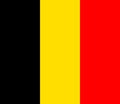Your Majesty:
I am most grateful for your very gracious welcome. We in the United States well recall that Your Majesty's first official trip to another country, after ascending the throne, was made to our country. I am especially pleased, therefore, that my own first trip abroad as President begins in your country.
It was exactly half a century ago this year, in 1919, that one of America's greatest Presidents made an historic postwar visit to what was then a devastated Belgium. That was the last occasion on which an American President set foot on Belgian soil.
Speaking then to the Belgian Parliament, Woodrow Wilson declared on that occasion: "Belgium's cause has linked the governments of the civilized world together. They have realized their common duty. They have drawn together as if instinctively into a league of right. They have put the whole power of organized manhood behind this conception of justice which is common to mankind."
"That," he said, "is the significance of the League of Nations."
Woodrow Wilson's dream collapsed and the League failed, as the people of Belgium know all too tragically. But the search goes on for a durable peace, one that symbolizes and embodies what Wilson then called "this conception of justice which is common to mankind"--or, as I heard Your Majesty describe it so eloquently just 10 years ago, in addressing the United States Congress: "Peace is the tranquility of order. Mere tranquility can be cold war, but the tranquility of order implies justice."
The search for that peace is what brings me now to Europe, to begin the process of consultation with America's allies and gathering their judgment.
It seems altogether appropriate that the first stop on such a trip should be Belgium. Belgium maintains, despite the tragic events of 1914 and 1940, its remarkable spirit, and rebounded from each ordeal with the vigor and resilience of what Your Majesty has just referred to as "a free and ancient land," and not least, a nation that has played so creative a role during the past 20 years in developing the institutions that give substance to the concept of an Atlantic community.
The peoples of our two countries have shared many things. We have been allies in war and partners in peace. But even more important, as we look to the future, are the common ideals that inspire us and that have made the friendship of our peoples so warm and so lasting.
I look forward with great pleasure to the prospect of working in the coming years with Your Majesty, with your government, and with the Belgian people, as together we press toward that peace with justice we all so earnestly seek.
Your Majesty, as I stand here I feel that I stand on hallowed ground for millions of Americans, as well as Belgians. This is the soil that twice in 50 years has been devastated by war. Therefore, it is altogether appropriate that this new search for the peace that will avoid that kind of devastation should begin on this soil. I am proud to be here and to be welcomed by you so graciously. I am confident that at the beginning of this journey, the fact that we start on this soil is a good omen for the future.
Thank you.
Note: The President spoke at approximately 9 p.m. at Brussels National Airport in response to welcoming remarks by King Baudouin of Belgium, who spoke as follows:
Mr. President, Belgium is glad to be the first country this side of the Atlantic to receive you on the occasion of the journey by which you have chosen to begin the great task that is involving you in world affairs.
You have come to a free and ancient land which is happy to be the host country of important international organizations, the European Community and NATO.
I have pleasure in welcoming you in Belgium and on our continent. We are delighted at the initiative you are taking, since it aims at coordinating for joint action in the cause of peace the views of the United States of America and those of Europe, which, despite the difficulties accumulated by history, is advancing on the road to unity.
During this year, which will perhaps be that of man's first landing on the moon, we are more than ever conscious of the gulf between the wonderful possibilities open to us and the obligations which burden the world because of war, want, injustice, and inequality.
May your journey and your interviews provide an opportunity for friendly nations better to combine their efforts to solve their problems on which the very future of mankind depends.
May they also make easier a sincere dialogue and sound agreement with those who are governed by other political systems and who share the awe-inspiring responsibility for world peace.
If so, a prayer will be granted.
Richard Nixon, Remarks on Arrival in Brussels Online by Gerhard Peters and John T. Woolley, The American Presidency Project https://www.presidency.ucsb.edu/node/240567


